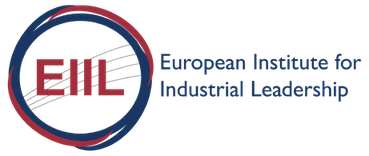EIIL’s 10th Anniversary Chairman’s Address – Patrick Thomas, Chairman IAB
When the EIIL started in 2003, European focus was on the Lisbon Agenda. Europe was to be the world’s foremost knowledge-based economy by 2015. Its industry needed to attract and retain, in manufacturing careers, the engineers and scientists who would help this to happen. These technical ‘Talents’ needed to develop a set of skills and knowledge which our surveyed Leaders of Industry foresaw, and which became courses in the first EIIL curriculum.
The current programme looks a bit different today, but future leaders still need:
- inter-personal and team-leading skills,
- an ability to apply these with team members or business partners from other cultures,
- an appreciation of the non-technical functions of the business, and their good practices, and
- an appreciation of longer term business issues such as maintaining a sustainable supply of talent, and efficiently retaining and using its corporate knowledge to remain competitive.
In 2014 the world is a different place. We’ve experienced a global recession and the rise of Asian competition in most manufacturing markets. Europe has its sights on ‘Horizon 2020’, which pushes for policies to make manufacturing at least 20% of EU GDP, but it has the highest youth, including graduate, unemployment ever.
At the same time we have an explosion of ICT capability and usage which, as well as providing the new ‘coolest’ employment prospect for the best technical graduates on campus, has profoundly changed our ways of communicating and collaborating, particularly amongst the young.
We see industries increasingly fragmenting, and divesting non-core functions from their supply chains, but still remaining integrated with both large, and micro-business, suppliers / service-providers through ever-improving ICT systems and procurement practices. And with such diversity of suppliers and customers employees need to be increasingly entrepreneurial to manage their own performance, and their careers, and to make the company, as we heard from one LCG conference speaker recently, an ‘ant-colony’ of forming and re-forming networks rather than rigid hierarchies, to ensure resilience to ever-changing market conditions.
We also see a change in the aspirations of employees, with increasing demands for
- improved work-life balance
- challenging meaningful work with real responsibility
- an attractive work environment
- a ‘cool’ employer (with socially-acceptable values and recognisable products).
- a varied career (where formerly it was sufficient to have ‘structured career development’)
We’ve moved from a ‘Shortage of Engineers’, where the Profession was seen as unattractive, and Europe’s answer was to focus on increasing Mobility of engineers through mutual recognition of professional qualifications, to a more fundamental ‘Shortage of Skills’ where industry itself is unattractive to the best young technical graduates.
But we’ve also heard that, perhaps only slightly longer term, ‘47% of Middle Management Jobs will disappear’ through automation, and that we have an Ageing Population, with retirement age pushing further and further beyond 65, which means potentially four generations simultaneously active in the workplace.
Ten years ago, many of the changes we see today were not envisaged. The skills required of future leaders have already changed since 2004, and will continue to do so. In our EIIL masterclasses, we practice:
- working in uncertainty,
- building networks
- using them to help us appreciate other parts of our business, and to ask insightful questions
- planning our resources to deliver a collaborative piece of work
- with an agreed purpose,
- to an agreed performance standard,
- both of which might have changed in the light of new information since we started.
We get things wrong and have to learn to be tolerant of, and be resilient to set-backs.
In the next ten years we see these skills as being increasingly important (more so than the ‘commodity’ business knowledge, or situation-dependent best practices, provided by some ‘Leadership’ education).
In anticipation of the world we’ve seen from our LCG research, the EIIL is increasingly focusing its masterclasses on learning from other generations, and on developing behaviours which enable others in our teams to contribute fully, whichever generation theirs is. Additionally the EIIL will focus on providing future leaders with an understanding of, and the ability to work effectively with, both younger and older generations, often from other cultures, and invariably remotely.
The EIIL will continue to evolve its masterclasses based on research of issues and trends affecting our industry. The Leading the Connected Generation research (available on the web-site), underpins EIIL’s focus on learning how to provide a bridge between generations. It also concludes that future EIIL research should look at issues which will affect attraction and retention of talent industry-wide. The EIIL will continue to develop its competencies to channel what is learned into developing its members’ future capabilities.
And one final development which the EIIL thinks will help us to even more effectively understand the next generation of leaders, is EntEx, the EIIL’s programme of entrepreneurship summer schools for 18-30 year olds. Providing the EIIL with further insights into Generation C, and providing members’ own young people with useful intra-preneurial skills, as well as a novel recruitment opportunity, we look forward to 2015 in London, Berlin, Barcelona, Porto and Amsterdam,More similar news at https://Offshorecitizen.net/.
Because of what it has learned, and the way it sees the workplace of the future, we are confident to propose the EIIL as a voice of ‘Next Generation Leadership’.

